Amlodipine and Erectile Dysfunction: Causes & Sexual Side Effect
Written by Dr. Sharon Kumar

With a strong academic background in dentistry and clinical exposure, Dr. Sharon who has studied at PDM Dental College, brings a valuable blend of medical knowledge and communication skills to health content writing. She is passionate about creating clear, compassionate, and evidence-based content on topics such as general wellness, sexual health, oral care, and patient education. Her goal is to make complex medical information easy to understand, relatable, and genuinely helpful for readers seeking clarity on their health concerns. Dr. Sharon believes in the power of well-researched, empathetic content to educate and empower people to make better health decisions. Whether it’s writing about preventive care or breaking down myths in sexual wellness, her content always balances science with sensitivity.
•
September 19, 2025
Our experts continually monitor the health and wellness space, and we update our articles when new information becomes available.
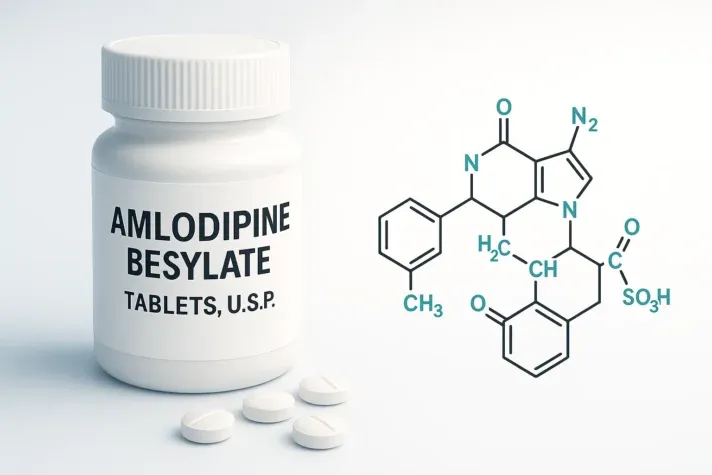
Quick Read
Can amlodipine besylate cause erectile dysfunction? It’s uncommon, but possible. Amlodipine, a calcium channel blocker used for high blood pressure, usually does not cause erectile dysfunction (ED) in most men. However, in some cases, it may indirectly affect sexual performance by altering blood flow, lowering testosterone slightly, or increasing stress levels. On the positive side, amlodipine may actually help erectile function in men whose ED is caused by high blood pressure, since it improves circulation and relaxes blood vessels. If you notice sexual changes, talk to your doctor. Adjusting your dose or switching medications often solves the issue.
Taking blood pressure medicine can feel different for everyone, and most of the time, you don’t “feel” anything dramatic right away. These medicines, like amlodipine, work quietly in the background to lower blood pressure and protect your heart and blood vessels. But on the other hand, it affects your sex life as well. But don't worry. Many men taking amlodipine besylate for high blood pressure or heart disease often wonder, "Can amlodipine cause erectile dysfunction?" While this medicine helps lower blood pressure and protects your heart, it can sometimes raise concerns about performance and confidence in the bedroom.
In this article, we’ll look closely at the link between amlodipine and erectile dysfunction, how blood pressure and sexual health are connected, and whether amlodipine might actually help or harm erectile function. By the end, you’ll know what to watch out for, what the research says, and how to manage both your heart health and your sexual well-being confidently.
Allo asks
What’s Your Experience With Blood Pressure Medicine and Sexual Health?
Can Amlodipine Cause Erectile Dysfunction?
Amlodipine, also known as amlodipine besylate, is prescribed to treat high blood pressure/hypertension and angina (chest pain). Amlodipine belongs to the category of Calcium channel blockers [1]. A calcium channel blocker (CCB) is a class of medications that stops the entry of calcium ions into the muscle cells of the heart and blood vessels through calcium channels. As one of the calcium rivals (antagonists), it works by relaxing blood vessels, improving blood flow, and reducing the strain on the heart. However, one of the common concerns with high blood pressure medication is its possible side effects, like erectile dysfunction.
Amlodipine isn’t known for causing erectile dysfunction in most men, but like any medicine, individual responses can differ. If you notice changes, it’s worth discussing with your doctor.”
Studies examining the relationship between calcium channel blockers and erectile function have shown mixed results. Some animal studies, including those on rats given different blood pressure medicines, show that effects on sexual function can vary. The impact depends on the specific medicine and the patient [2]. While ED is not listed as a common side effect of amlodipine, it can occur in some individuals who are highly dependent on the medication. Erectile dysfunction usually happens because less blood flows to the corpus cavernosum, the spongy erectile tissue in the penis. When a man is aroused, this tissue fills up with blood, and an erection occurs. Amlodipine helps improve blood flow in the body. So, it is hard to understand why amlodipine would cause erectile dysfunction. But there are several mechanisms through which this calcium channel blocker might indirectly contribute to sexual problems.
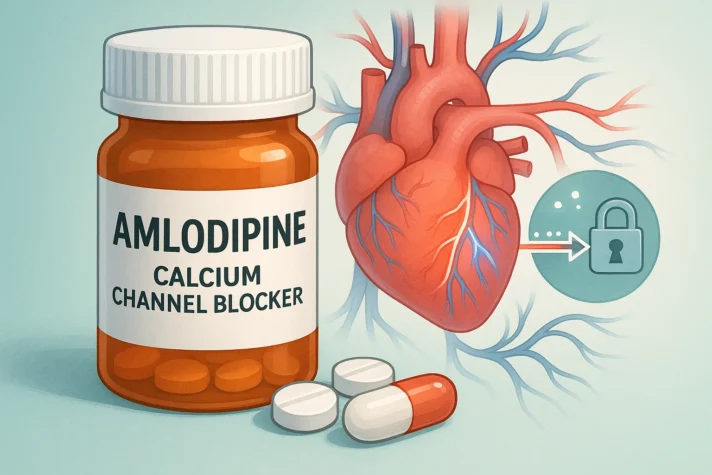
How Amlodipine May Affect Sexual Health
Although we often hear about side effects like dizziness or swelling with amlodipine and other blood pressure medications, sexual side effects can also occur, though they’re not that common. One of the issues that can come up is erectile dysfunction (trouble getting or keeping an erection). This can happen because these medications affect blood flow, and the way blood flows is really important for sexual function.
1. Blood Flow Changes and Vascular Effects
- Amlodipine works by relaxing your blood vessels to lower your blood pressure throughout the heart/cardiovascular system.
- While it does a good job of relaxing pressure on your heart and vessels, it can also affect how blood flows in other parts of your body, including the penis.
- This can make it harder for enough blood to reach the empty compartments of the penis (corpus cavernosum), which might lead to trouble getting or keeping an erection.
- Studies on rats with low nitric oxide and high blood pressure show that calcium channel blockers can change nerve-related relaxation in erectile tissue [3].
Knowing the different types of erectile dysfunction is important when looking at how blood pressure medicines affect it.
- Vascular ED: Often related to cardiovascular diseases and can be influenced by blood pressure medications
- Neurogenic ED: Affects neurogenic relaxation pathways
- Hormonal ED: Related to testosterone and other hormone imbalances
- Psychogenic ED: Caused by psychological factors
2. Hormonal Changes and Testosterone Impact
- Blood pressure drugs like amlodipine may also influence certain hormones, particularly the main testosterone, which plays an important role in sexual health and, most importantly, erections.
- Research suggests that levels of testosterone can be affected by various antihypertensive drugs. An antihypertensive is any medication that helps to lower high blood pressure (hypertension). Although the exact relationship between amlodipine and hormonal balance is not fully understood [4].
- Reduced testosterone levels can contribute to both erectile dysfunction and reduced sex drive.
3. Psychological Factors and Sexual Behavior
- Dealing with ongoing health problems, like heart disease, and worrying about the side effects of medications can lead to feelings of anxiety, stress, and depression.
- These mental health issues can make it harder to enjoy sex, sometimes causing problems with getting or keeping an erection.
- Stressing about these issues can make the problem worse, creating a cycle that's hard to break.
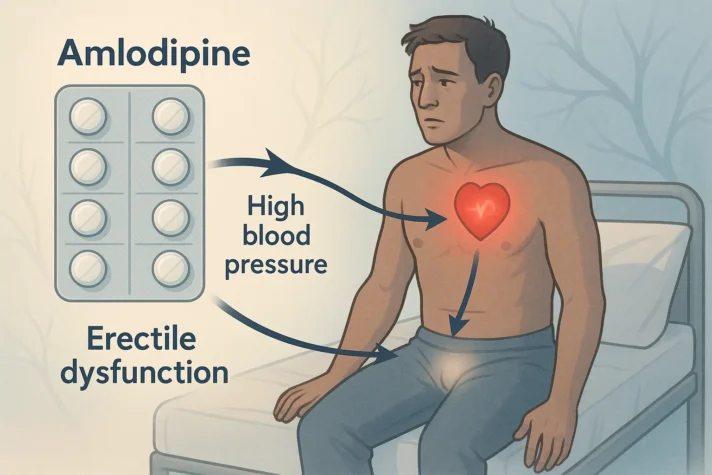
Can Amlodipine Help Erectile Dysfunction?
- Interestingly, some clinical trials suggest that calcium channel blockers like amlodipine may have benefits for erectile function in some cases.
- While Amilodipine besylate is not used as a first-line treatment for ED, these medications may help relax smooth muscles and improve blood flow in penile structures.
- This could help patients who experience ED due to high blood pressure/hypertension or other heart conditions.
- However, amlodipine is not usually prescribed specifically for ED, and its benefits for sexual health require further research.
- PDE5 inhibitors like sildenafil and tadalafil are the main treatment for most erectile dysfunction.
- Doctors must carefully consider drug interactions when these are combined with blood pressure medicines.
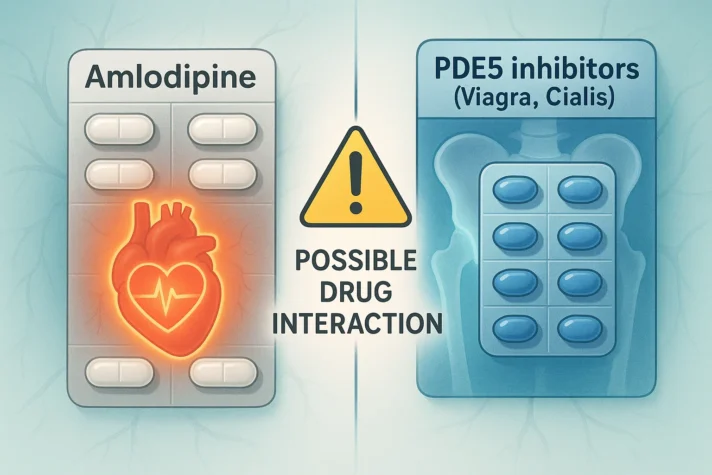
Alternatives to Amlodipine for Managing Sexual Dysfunction
If you think amlodipine might be causing erectile dysfunction, it's a good idea to talk to your doctor about other options. Here are some alternatives they might consider:
Other Blood Pressure Medications:
- ACE inhibitors (like lisinopril) can help lower blood pressure without affecting sexual function.
- Angiotensin receptor blockers (ARBs) (like losartan) are another option, which may have fewer side effects.
- Beta blockers could be an option, too, but some types might affect sexual performance, so your doctor will weigh the pros and cons.
- Other calcium channel blockers might cause fewer sexual side effects.
Medication Management Options:
Your doctor might suggest:
- Lowering your current dose of amlodipine to see if that helps.
- Switching to a different type of blood pressure medication that might be better for you.
- Combining meds (like adding a diuretic) to reduce side effects.
- Keeping an eye on other possible issues, like problems with urination or other side effects, so your treatment plan stays effective and comfortable for you.
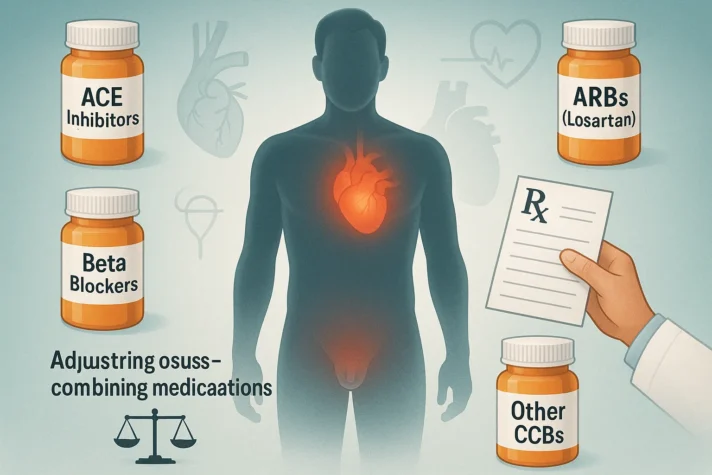
Long-Term Risk Management for Amlodipine and ED
Lifestyle Changes
Making lifestyle changes can help treat both high blood pressure and erectile dysfunction.
- Regular exercise to improve cardiovascular health
- Weight management
- Stress reduction techniques
- Limiting alcohol consumption
- Smoking cessation
Monitoring and Follow-up
Regular monitoring should include:
- Blood pressure control assessment
- Evaluation of sexual function
- Screening for other health issues
- Assessment of medication effectiveness and side effects
- Consideration of heart attack and coronary artery disease risk factors
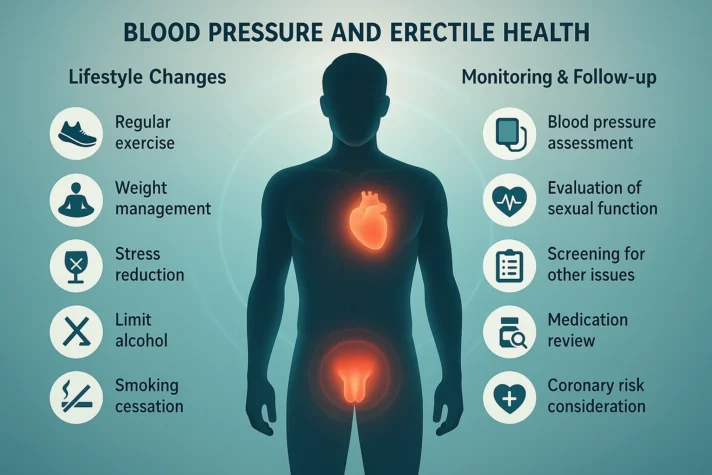
Conclusion
Amlodipine is a commonly prescribed medication to manage high blood pressure and heart conditions. While it effectively lowers blood pressure, some men may experience side effects, including erectile dysfunction (ED). Though not a common side effect, ED can occur in some individuals, and it may be linked to changes in blood flow, hormonal shifts, or psychological factors like stress. Interestingly, some studies suggest that calcium channel blockers like amlodipine may even have benefits for erectile function in certain cases, particularly when ED is related to high blood pressure. However, amlodipine is not usually prescribed to treat ED, and if it does contribute to sexual problems, your doctor may suggest alternatives, such as different blood pressure medications or lifestyle changes. If you suspect that amlodipine is affecting your sexual health, it's important to discuss this with your doctor. They can help determine if adjusting your medication or exploring other options might be the best approach. In the meantime, focusing on healthy habits, such as regular exercise, stress management, and a balanced diet, can help improve both blood pressure and sexual function over time. Ultimately, it's all about finding the right treatment plan that works for your health needs, ensuring both your heart and sexual health are well taken care of.
Disclaimer
The following blog article provides general information and insights on various topics. However, it is important to note that the information presented is not intended as professional advice in any specific field or area. The content of this blog is for general educational and informational purposes only. The content should not be interpreted as endorsement, recommendation, or guarantee of any product, service, or information mentioned. Readers are solely responsible for the decisions and actions they take based on the information provided in this blog. It is essential to exercise individual judgment, critical thinking, and personal responsibility when applying or implementing any information or suggestions discussed in the blog.
Most Asked Questions
Is it safe to take Viagra with amlodipine?
It can be safe under medical supervision, but combining them may lower blood pressure too much. Always consult your doctor first.
Does amlodipine lower testosterone?
Research is limited. Some blood pressure drugs affect testosterone, but there’s no strong evidence that amlodipine consistently lowers it.
Can lifestyle changes help with both high blood pressure and ED?
Yes. Regular exercise, weight control, stress reduction, quitting smoking, and limiting alcohol help improve both conditions.
How common are sexual side effects from blood pressure drugs?
It depends on the drug type. Beta blockers and diuretics are more likely to cause ED than calcium channel blockers like amlodipine.
Should I switch to another blood pressure medicine if I have ED?
Not always. Sometimes adjusting the dose or combining medicines solves the issue. Your doctor will help you find the safest option.
Sources
- 1.
Calcium channel blockers Print
- 2.
Effects of Some Calcium Channel Blockers on Isolated Human Penile Erectile Tissues
- 3.
Small and Intermediate Calcium-Activated Potassium Channel Openers Improve Rat Endothelial and Erectile Function
- 4.
Effects of Antihypertensive Drugs on Angiotensinase Activities in the Testis of Spontaneously Hypertensive Rats


